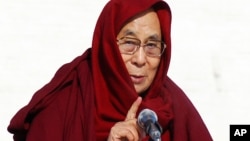China said on Tuesday it hopes Mongolia has learned a lesson and will keep a promise not to invite the Tibetan spiritual leader the Dalai Lama again after his visit in November led to a chill in relations.
The Dalai Lama is upheld as a spiritual leader in predominantly Buddhist Mongolia, but China regards him as a dangerous separatist and warned Mongolia before the visit that it could damage ties.
"The Dalai Lama's furtive visit to Mongolia brought a negative impact to China-Mongolia relations," Chinese Foreign Minister Wang Yi told Mongolia's Minister of Foreign Affairs Tsend Munkh-Orgil by telephone.
"We hope that Mongolia has taken this lesson to heart," he said, according to a statement posted on the Chinese Foreign Ministry's website.
China also hoped Mongolia would "scrupulously abide by its promise" not to invite the Dalai Lama again, Wang said.
The Mongolian minister was not available for comment but the Chinese ministry said he expressed regret at the negative impact caused by the visit and reaffirmed his government's position that the Dalai Lama would not be invited again, first stated in December.
A week after the November visit, China imposed fees on commodity imports from Mongolia, charging additional transit costs on goods passing through a border crossing into China's northern region of Inner Mongolia.
"Mongolia firmly supports the one-China policy, consistently holds that Tibet is an inseparable part of China, that the Tibet issue is China's internal affair," the Mongolian minister was quoted as saying.
Mongolia has been working to boost economic ties with its powerful southern neighbor and use Chinese investment and know-how in mining and infrastructure projects.
Mongolia had previously said the Dalai Lama's trip had nothing to do with the government and he had been invited by Mongolian Buddhists.
The Dalai Lama fled Tibet after an abortive uprising against Chinese rule in 1959. He is based in India. Beijing regards him as a "splittist", though he says he seeks genuine autonomy for his Himalayan homeland, which Communist Chinese troops "peacefully liberated" in 1950.
Rights groups and exiles say China tramples on the religious and cultural rights of the Tibetan people, accusations denied by Beijing, which says its rule has ended serfdom and brought prosperity to a once-backward region.





